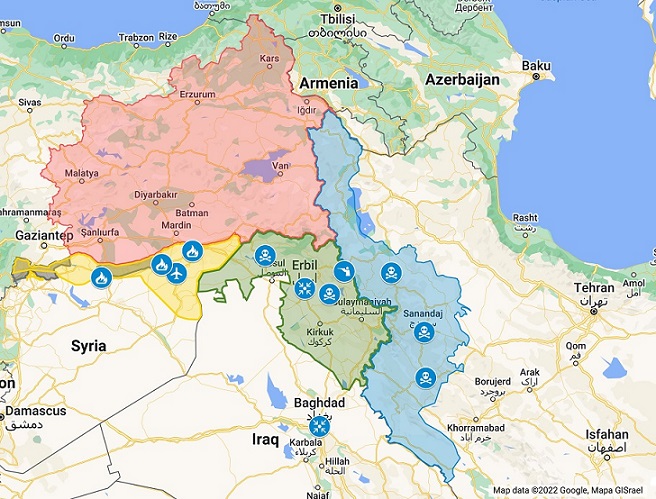1.5K
A weekly brief of events occurred in the Kurdistan regions of Iran, Iraq, Syria, and Turkey.
Iran
- The Hengaw Organization for Human Rights identified 123 civilians killed by the Iranian regime in 47 Kurdish cities since the latest round of anti-government protests began on September 17. The regime has also injured more than 8,000 demonstrators and civilians and continues to jail thousands more. Further, Iranian authorities killed at least four Kurds, including two, Shadman Ahmadi and Shahriar Adeli, that were tortured to death, last week. Simultaneously, the regime continued kidnapping activists and offering no information on their fate or whereabouts, including three demonstrators in Kermanshah, a female activist named Marjan Dawoodi in Qasr Shirin, and another female activist, Beta Waissi, in Sina. Iranian authorities also banned dozens of store owners in Ravansar from opening their businesses for participating in general strikes and arrested dozens of merchants in Oshnavieh (Shinno). Concomitantly, Amnesty International reported the Iranian regime killed 44 children and forced their families to remain silent. “Ten of the children killed, which amounts to 20%, were from the Kurdish minority and were killed in eight cities or towns in the Kurdish populated provinces of Kurdistan, Kermanshah and West Azerbaijan,” read Amnesty’s report. In addition, the regime executed two protesters who were previously sentenced to death, one of whom was publicly hanged from a crane. A Kurdish singer named Saman Yassin is also awaiting execution after Tehran’s Islamic Revolutionary Court sentenced him to death for performing a pro-demonstration song. Meanwhile, the U.S. and Canada sanctioned several Iranian officials for human rights violations.
- On Monday, the Islamic Revolutionary Guard Corps (IRGC) shot and killed two Iraqi Kurdish brothers, Zango and Zhuair Zahidi, while they tended to their cattle near Mount Qandil. The IRGC has deployed large numbers of personnel along the Iran-Iraq border to interdict Kurdish border porters (kolbars), but the Iranian regime has also threatened to invade Iraqi Kurdistan to eliminate Iranian opposition groups.
Iraq
- On Monday, a terrorist attacked a security building in the Duhok province, killing a public security officer (Asayesh) and injuring another. After clashing with Asayesh members, the terrorist was killed and later identified. In Sulaymaniyah, the security forces captured a terrorist wanted by Nineveh’s court for terror activities.
- A delegation of the Kurdistan Regional Government (KRG) visited Baghdad and held several meetings, discussing the outstanding issues, including the federal budget and natural resources. The Iraqi president Latif Rashid met with the delegation and said:” Solutions to the unresolved issues must be found through dialogue as soon as possible and in accordance with the Iraqi Constitution and law.” In Erbil, a senior Iraqi military delegation met with Kurdish counterparts about border security. The two sides agreed on the final steps to hire and deploy border guards alongside Turkey and Iran.
- The Mayor of Koya district Tariq Haider told Rudaw that 700 Kurdish refugee families from Iran have not returned to their homes, fearing more IRGC missile and drone attacks. The Iranian regime bombed Koya twice since anti-government demonstrations started in September, targeting the Kurdish opposition and their families residing in the town for decades.
- After visiting Baghdad, Hungarian President Katalin Novak visited the Kurdistan Region, meeting top government officials in Erbil. A statement from Kurdistan’s presidency said President Nechirvan Barzani “emphasized their mutual readiness to develop their bilateral relations and cooperation in all areas” during his meeting with President Novak. The Hungarian president stayed in Erbil overnight and met with Yazidi women survivors of the 2014 genocide by ISIS (Da’esh).
Syria
- The Syrian Democratic Forces (SDF) said they shut down a Turkish loitering munition near Zarkan (Abu Rasin) on Sunday. That said, Turkey and its Syrian proxies attacked Ain Essa, Tal Tamer, Zarkan, and several villages with artillery and rockets. The attacks killed a 61-year-old man named Saleh Ali and disabled a communications tower. Additionally, dozens of families were displaced, and Turkish proxies cut off the main fresh water supply to the area. Concurrently, after the U.S. pressured Turkey to shelve plans for an invasion of northeastern Syria, Turkish President Recep Tayyip Erdogan demanded Russia facilitate the SDF’s removal from most of northern Syria. While Russia’s position on the SDF remains unclear, Turkey took another step towards normalization with the Assad regime after a senior member of Erdogan’s Justice and Development Party (AKP) noted potential cooperation on counterterrorism and maintaining Syria’s territorial integrity.
Turkey
- The Pro-Kurdish Peoples’ Democratic Party (HDP) Law and Human Rights Commission co-spokesperson Serhat Eren announced that the Turkish government had arrested 16,000 party members and supporters since 2015. Among those, 5,000 were jailed, including elected officials. On Friday, the Turkish police in Istanbul arrested seven people during a “Justice Vigil” held by mothers of ill political prisoners, calling for their release. Separately, eleven members of HDP are facing charges of “insulting Turkishness” after remarks about the Armenian Genocide. Moreover, the HDP’s Foreign Affairs Commission bashed the Turkish government for planned invasion and attacks on Syria’s Kurds using the pretext of the Istanbul bombing. “Inconsistencies, contradictions, and improbabilities,” how the HDP described the government’s pieces of evidence for the Istanbul bombing, blaming the ruling parties for rejecting the HDP’s proposal in the parliament that called for “complete investigations. The HDP said the data by the Armed Conflict Location and Event Data Project (ACLED) shows 3,319 attacks on the SDF by Turkey since 2017 unlike Turkish government’s “claims that there are security threats from the SDF and YPG in northern Syria and the Turkish army is using the right to self-defense. “

